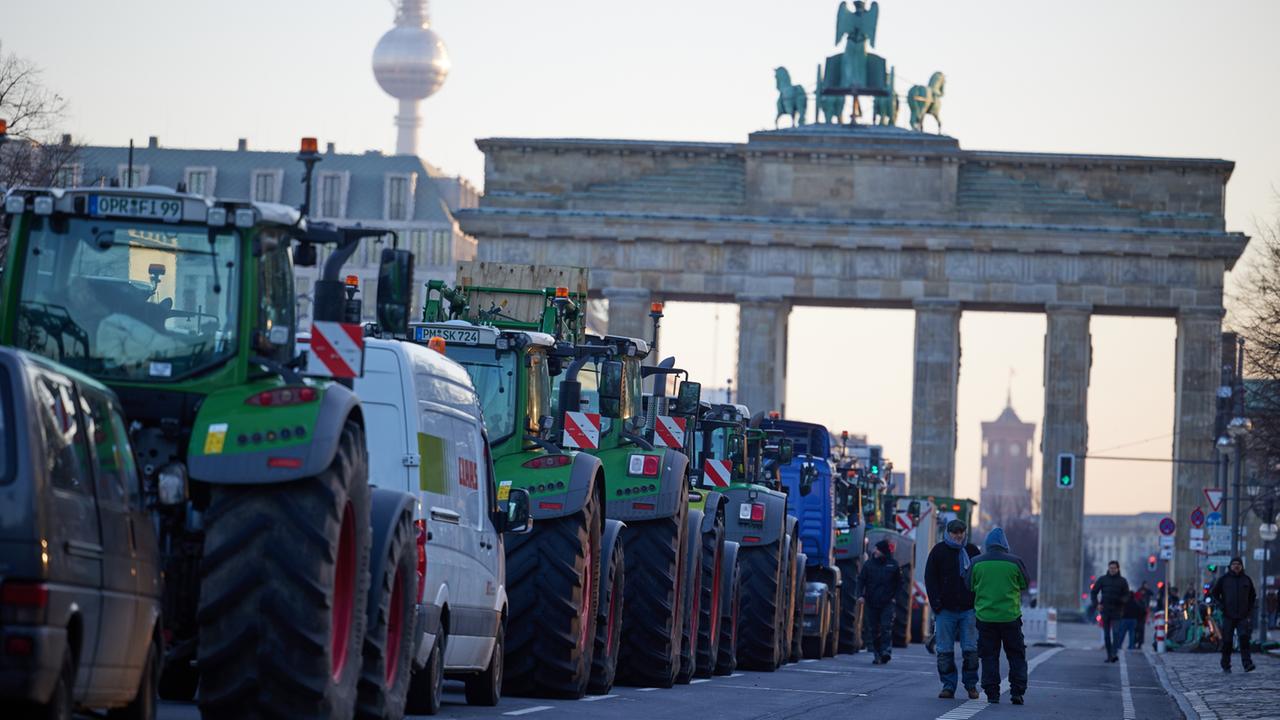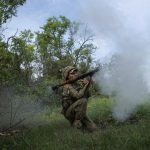Since morning, farmers across the country have been protesting against the federal government’s agricultural policy. There are blockages and significant traffic disruptions in numerous cities and on motorways. The police called for a peaceful approach.
The nationwide farmers’ protests have begun with blockades on motorway entrances and tractor convoys. In Mecklenburg-Western Pomerania, for example, farmers across the country blocked highway entrances with hundreds of tractors. They were supported by freight forwarding companies who protested against the increase in truck tolls.
According to police, several tractors were on the motorway in an unannounced demonstration on the A81 near Böblingen in Baden-Württemberg. In the Cloppenburg district in northwest Lower Saxony, a federal highway was blocked by 40 vehicles.
In Saxony, according to the police, some motorway entrances in the Dresden area were unusable. In Bavaria, the police reported traffic disruptions in many places, for example because roads only had one lane or motorway entrances were blocked.
There were further blockades and traffic obstructions caused by slow-moving tractor convoys in the morning in practically all federal states from southern Germany via Rhineland-Palatinate and North Rhine-Westphalia to Schleswig-Holstein.
More than 5,000 tractors in Munich
There were also protests in the cities. In Hamburg and Bremen, larger tractor convoys reached the urban areas and blocked traffic, the police said. According to registrations for demonstrations, 2,000 tractors want to gather there.
According to the police, protest participants with 566 tractors, trucks, cars, vans and trailers had gathered at the Brandenburg Gate in Berlin by ten o’clock. In addition to the farmers, many bus and truck drivers also took part in the protest, and many craftsmen were also among the demonstrators. In Munich, the police said they accompanied around 5,500 tractors from the surrounding region towards the city center, where a rally is planned later.
Entire cities sealed off
According to the police, “an approximately 20-kilometer convoy with around 1,000 vehicles moved through Stralsund in Mecklenburg-Western Pomerania.” In Brandenburg, officials reported that entire cities had been sealed off by protesting farmers. There is “currently no possibility” of entering the urban area of Brandenburg an der Havel, the police said on the short message service X, formerly Twitter. Access to Cottbus will probably no longer be possible in the near future.
In Rhineland-Palatinate, according to police, an 18 to 20 kilometer long convoy with more than 1,000 tractors and trucks was moving along Autobahn 63 towards the state capital Mainz. The highway was therefore completely closed. According to the police, there were already numerous demonstrating farmers with heavy machinery in Düsseldorf in North Rhine-Westphalia on Monday.
Protests bring production at the VW factory to a standstill
As a result of the farmers’ protests, production at the Volkswagen plant in Emden in East Frisia also came to a standstill. “Production is complete today,” said a VW spokeswoman. The routes to the plant were blocked by the farmers’ protests. It is therefore not possible for employees to come to work.
The production of combustion engine models was affected. Production of the electric cars is scheduled to start again next week after the Christmas holidays. It is not known exactly how many employees were affected by the outage. Production is scheduled to resume on Tuesday.
Protester hit by car
A participant in the protests in Lower Saxony was hit by a driver and injured. The Oldenburg Police Department announced this on the X platform, formerly Twitter. The incident occurred near Friesoythe. The driver wanted to avoid a blockade on a sidewalk and cycle path and collided with a demonstrator. According to the officers, the driver initially fled, but was later caught.
A police spokesman said the participant was believed to be seriously injured. He was taken to a clinic in a rescue helicopter. The police were unable to provide any further details. It is still unclear whether the driver intentionally injured the participant when driving around or not.
“We appeal to peacefulness”
Several state education ministries announced that students would be excused if they could not make it to class because of the actions. In the Friesland district (Lower Saxony), for example, face-to-face teaching was canceled at all general and vocational schools today due to the announced protests.
The chairman of the police union (GdP), Jochen Kopelke, called on those taking part in the protests to be peaceful. “In view of the expected masses of protesters, the police will have to act very quickly and very flexibly in Germany. But they are not sufficiently prepared for this,” Kopelke told the newspapers of the Funke media group. “We therefore appeal to the peacefulness and sensitivity of the participants and in particular to the responsible meeting chairs.”
Scholz: No moving away from agricultural decisions
Chancellor Olaf Scholz said he wanted to stick to the traffic light cuts plans despite the protests. “The federal government stands by it,” he said after a meeting with Luxembourg’s Prime Minister Luc Frieden in the Chancellery in Berlin. The subsidies have been criticized for many years – and when subsidies are reduced, there are always voices that say, “but not this one.” Now the government is sticking to its plan, which should be voted on in the Bundestag “in a very short time.”
With a view to the farmers’ week of protest, the Chancellor said: “Criticism is part of democracy. It is necessary and is part of it. Nobody can complain about that. At least I won’t.” Scholz added: “Of course, the end does not justify all means. That is why, in view of the concession of the federal government, which has already reversed parts of the cuts in agricultural diesel after protests, it is important that moderation is now maintained.” That should also be the case be a concern of Democrats, “especially in times like these.”
Association asks for your understanding
The President of the German Farmers’ Association (DBV), Joachim Rukwied, once again asked for understanding from those affected by the farmers’ blockade actions. It’s about “the future of our farming families” and also about food security and thus “the future of our country,” said Rukwied on the sidelines of the closed meeting of the CSU regional group in Seeon Monastery. The federal government’s policy is directed against German farmers. “Here they are trying to set up a resolution scenario that is absolutely unacceptable,” Rukwied continued.
The farmers’ association had called for the week of action to demonstrate against the removal of subsidies for the industry. The main issue is the tax relief for agricultural diesel. A partial withdrawal of the federal government’s austerity plans is not enough for the association.
Weil calls for cuts to be reversed
Lower Saxony’s Prime Minister Stephan Weil called on the traffic light government to reverse its planned subsidy cuts for agriculture. It was his “urgent recommendation to the federal government to clear the air,” said the SPD politician in the morning magazine ARD and ZDF. “I think it would be good to end this conflict,” he added.
Weil cited the example of the cancellation of agricultural diesel, which is to take place gradually by 2026. This is “a serious burden”, especially for smaller companies. The higher CO2 prices would also affect farmers.




